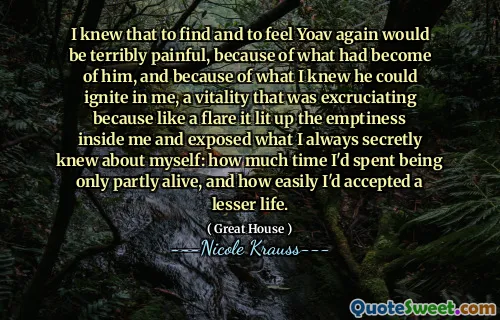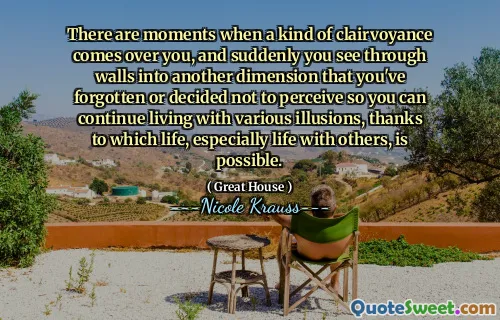
I knew that to find and to feel Yoav again would be terribly painful, because of what had become of him, and because of what I knew he could ignite in me, a vitality that was excruciating because like a flare it lit up the emptiness inside me and exposed what I always secretly knew about myself: how much time I'd spent being only partly alive, and how easily I'd accepted a lesser life.
This quote resonates deeply with the familiar human experience of longing and self-awareness. It speaks to the bittersweet nature of rekindling past connections—how reunions can evoke both joy and pain. The recognition that reuniting with Yoav would be painfully transformative underscores a universal truth: sometimes, confronting cherished memories or lost parts of ourselves requires facing discomfort and vulnerability. The metaphor of vitality as a flare illuminating emptiness is particularly striking. It captures the paradox of intense emotional awakenings—how they can bring life and clarity but also expose our inner voids. Through this, the narrator reflects on a profound epiphany about personal existence: living partially, settling for less, perhaps out of fear or complacency. We often accept a diminished version of life, tolerating dullness rather than risking the upheaval that full engagement might bring. The quote encourages introspection about the choices that lead us to embody a 'lesser life' and warns of the costs of complacency. It invites us to consider embracing vulnerability as a path toward authentic vitality, even if it means confronting painful truths. The depth of such self-realization emphasizes the delicate balance between yearning for connection and fear of the upheaval it can cause. Overall, this passage encapsulates the complexity of emotional awakening, the cost of self-awareness, and the courage required to pursue a fuller, more authentic life—despite its inevitable pain.







